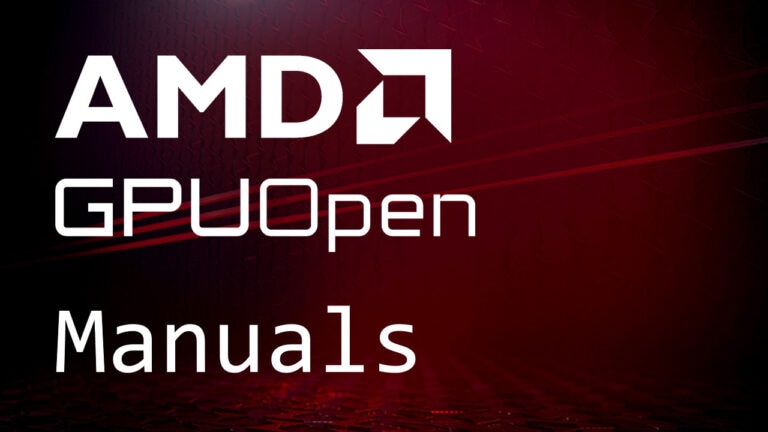ManualPowerTuning
Demonstrates how to control manual power tuning when programming with ADLX.
Command Prompts
| Command Prompt | Description |
|---|---|
| 1 | Get power limit range. |
| 2 | Get current power limit. |
| 3 | Set power limit. |
| 4 | Check TDC limit supported. |
| 5 | Get TDC limit range. |
| 6 | Get current TDC limit. |
| 7 | Set TDC limit. |
| 8 | Get default power limit. |
| 9 | Get default TDC limit. |
| M/m | Show this menu. |
| Q/q | Quit. |
Sample Path
/Samples/CPP/GPUTuning/ManualPowerTuning
Code
//
// Copyright (c) 2021 - 2025 Advanced Micro Devices, Inc. All rights reserved.
//
//-------------------------------------------------------------------------------------------------
#include "SDK/ADLXHelper/Windows/Cpp/ADLXHelper.h"
#include "SDK/Include/IGPUManualPowerTuning.h"
#include "SDK/Include/IGPUTuning.h"
#include <iostream>
// Use ADLX namespace
using namespace adlx;
// ADLXHelper instance
// No outstanding interfaces from ADLX must exist when ADLX is destroyed.
// Use global variables to ensure validity of the interface.
static ADLXHelper g_ADLXHelp;
// Main menu
void MainMenu();
// Menu action control
void MenuControl(IADLXManualPowerTuningPtr manualPowerTuning);
// Wait for exit with error message
int WaitAndExit(const char* msg, const int retCode);
// Display power limit range
void ShowGetPowerLimitRange(IADLXManualPowerTuningPtr manualPowerTuning);
// Display current power limit
void ShowGetPowerLimit(IADLXManualPowerTuningPtr manualPowerTuning);
// Display default power limit
void ShowGetPowerLimitDefault(IADLXManualPowerTuningPtr manualPowerTuning);
// Set power limit
void ShowSetPowerLimit(IADLXManualPowerTuningPtr manualPowerTuning);
//Show to check TDC limit is supported
void ShowTDCLimitSupported(IADLXManualPowerTuningPtr manualPowerTuning);
// Show how to get TDC limit range.
void ShowGetTDCLimitRange(IADLXManualPowerTuningPtr manualPowerTuning);
// Show how to get current TDC limit.
void ShowGetTDCLimit(IADLXManualPowerTuningPtr manualPowerTuning);
// Show how to get default TDC limit.
void ShowGetTDCLimitDefault(IADLXManualPowerTuningPtr manualPowerTuning);
// Show how to set TDC limit.
void ShowSetTDCLimit(IADLXManualPowerTuningPtr manualPowerTuning);
int main()
{
ADLX_RESULT res = ADLX_FAIL ;
// Initialize ADLX
res = g_ADLXHelp.Initialize();
if (ADLX_SUCCEEDED (res))
{
IADLXGPUTuningServicesPtr gpuTuningService;
res = g_ADLXHelp.GetSystemServices()->GetGPUTuningServices(&gpuTuningService);
if (ADLX_FAILED (res))
{
std::cout << "\\tGet GPU tuning services failed " << std::endl;
goto EXIT;
}
IADLXGPUListPtr gpus;
res = g_ADLXHelp.GetSystemServices()->GetGPUs(&gpus);
if (ADLX_FAILED (res))
{
std::cout << "\\tGet GPU list failed " << std::endl;
goto EXIT;
}
IADLXGPUPtr oneGPU;
res = gpus->At(0, &oneGPU);
if (ADLX_FAILED (res) || oneGPU == nullptr)
{
std::cout << "\\tGet GPU failed " << std::endl;
goto EXIT;
}
adlx_bool supported = false;
res = gpuTuningService->IsSupportedManualPowerTuning(oneGPU, &supported);
if (ADLX_FAILED (res) || supported == false)
{
std::cout << "\\tThis GPU does not support manual power tuning " << std::endl;
goto EXIT;
}
IADLXInterfacePtr manualPowerTuni.gifc;
res = gpuTuningService->GetManualPowerTuning(oneGPU, &manualPowerTuni.gifc);
if (ADLX_FAILED (res) || manualPowerTuni.gifc == nullptr)
{
std::cout << "\\tGet manual power tuning interface failed " << std::endl;
goto EXIT;
}
IADLXManualPowerTuningPtr manualPowerTuning(manualPowerTuni.gifc);
if (manualPowerTuning == nullptr)
{
std::cout << "\\tGet manual power tuning failed " << std::endl;
goto EXIT;
}
// Display main menu options
MainMenu();
// Get and execute the choice
MenuControl(manualPowerTuning);
}
else
return WaitAndExit("\\tg_ADLXHelp initialize failed", 0);
EXIT:
// Destroy ADLX
res = g_ADLXHelp.Terminate();
std::cout << "Destroy ADLX res: " << res << std::endl;
// Pause to see the print out
system("pause");
return 0;
}
// Main menu
void MainMenu()
{
std::cout << "\\tChoose from the following options:" << std::endl;
std::cout << "\\t->Press 1 to show how to get power limit range" << std::endl;
std::cout << "\\t->Press 2 to show how to get current power limit" << std::endl;
std::cout << "\\t->Press 3 to show how to set power limit" << std::endl;
std::cout << "\\t->Press 4 to show TDC Limit is supported" << std::endl;
std::cout << "\\t->Press 5 to show how to get TDC limit range" << std::endl;
std::cout << "\\t->Press 6 to show how to get current TDC limit" << std::endl;
std::cout << "\\t->Press 7 to show how to set TDC limit" << std::endl;
std::cout << "\\t->Press 8 to show how to get default power limit" << std::endl;
std::cout << "\\t->Press 9 to show how to get default TDC limit" << std::endl;
std::cout << "\\t->Press Q/q to terminate the application" << std::endl;
std::cout << "\\t->Press M/m to display main menu options" << std::endl;
}
// Menu action control
void MenuControl(IADLXManualPowerTuningPtr manualPowerTuning)
{
int num = 0;
while ((num = getchar()) != 'q' && num != 'Q')
{
switch (num)
{
// Display power limit range
case '1':
ShowGetPowerLimitRange(manualPowerTuning);
break;
// Display current power limit
case '2':
ShowGetPowerLimit(manualPowerTuning);
break;
// Set power limit
case '3':
ShowSetPowerLimit(manualPowerTuning);
break;
// Show to check if TDCLimit is supported
case '4':
ShowTDCLimitSupported(manualPowerTuning);
break;
// Show how to get TDC limit range.
case '5':
ShowGetTDCLimitRange(manualPowerTuning);
break;
// Show how to get current TDC limit.
case '6':
ShowGetTDCLimit(manualPowerTuning);
break;
// Show how to set TDC limit.
case '7':
ShowSetTDCLimit(manualPowerTuning);
break;
// Display default power limit
case '8':
ShowGetPowerLimitDefault(manualPowerTuning);
break;
// Show how to get default TDC limit.
case '9':
ShowGetTDCLimitDefault(manualPowerTuning);
break;
// Display menu options
case 'm':
case 'M':
MainMenu();
break;
default:
break;
}
}
}
// Wait for exit with error message
int WaitAndExit(const char* msg, const int retCode)
{
// Printout the message and pause to see it before returning the desired code
if (nullptr != msg)
std::cout << msg << std::endl;
system("pause");
return retCode;
}
// Display power limit range
void ShowGetPowerLimitRange(IADLXManualPowerTuningPtr manualPowerTuning)
{
ADLX_IntRange powerRange;
ADLX_RESULT res = manualPowerTuning->GetPowerLimitRange(&powerRange);
std::cout << "\\tPower limit range: (" << powerRange.minValue
<< ", " << powerRange.maxValue << ")" << ", return code is: "<< res << "(0 means success)" << std::endl;
}
// Display current power limit
void ShowGetPowerLimit(IADLXManualPowerTuningPtr manualPowerTuning)
{
adlx_int powerLimit;
ADLX_RESULT res = manualPowerTuning->GetPowerLimit(&powerLimit);
std::cout << "\\tCurrent power limit: " << powerLimit << ", return code is: "<< res << "(0 means success)" << std::endl;
}
// Display default power limit
void ShowGetPowerLimitDefault(IADLXManualPowerTuningPtr manualPowerTuning)
{
IADLXManualPowerTuning1Ptr manualGFXTuning1(manualPowerTuning);
if (manualGFXTuning1 == nullptr)
{
std::cout << "\\tGet IADLXManualPowerTuning1Ptr failed" << std::endl;
return;
}
adlx_int powerLimit;
ADLX_RESULT res = manualGFXTuning1->GetPowerLimitDefault(&powerLimit);
std::cout << "\\tDefault power limit: " << powerLimit << ", return code is: " << res << "(0 means success)" << std::endl;
}
// Set power limit
void ShowSetPowerLimit(IADLXManualPowerTuningPtr manualPowerTuning)
{
ADLX_IntRange powerRange;
ADLX_RESULT res = manualPowerTuning->GetPowerLimitRange(&powerRange);
res = manualPowerTuning->SetPowerLimit(powerRange.step + powerRange.minValue + (powerRange.maxValue - powerRange.minValue ) / 2);
std::cout << "\\tSet power limit " << (ADLX_SUCCEEDED (res) ? "succeeded" : "failed") << std::endl;
adlx_int powerLimit;
res = manualPowerTuning->GetPowerLimit(&powerLimit);
std::cout << "\\tSet current power limit to: " << powerLimit << ", return code is: "<< res << "(0 means success)" << std::endl;
}
// Show TDCLimit is supported.
void ShowTDCLimitSupported(IADLXManualPowerTuningPtr manualPowerTuning)
{
adlx_bool supportedTDC;
ADLX_RESULT res = manualPowerTuning->IsSupportedTDCLimit(&supportedTDC);
std::cout << "\\tTDC limit is supported: " << supportedTDC << ", return code is: "<< res << "(0 means success)" << std::endl;
}
// Show how to get tdc limit range.
void ShowGetTDCLimitRange(IADLXManualPowerTuningPtr manualPowerTuning)
{
ADLX_IntRange tdcRange;
ADLX_RESULT res = manualPowerTuning->GetTDCLimitRange(&tdcRange);
std::cout << "\\tGet TDC limit range is: (" << tdcRange.minValue
<< ", " << tdcRange.maxValue << "), return code (0 is Success) is: " << res << std::endl;
}
// Show how to get current TDC limit.
void ShowGetTDCLimit(IADLXManualPowerTuningPtr manualPowerTuning)
{
adlx_int tdcLimit;
ADLX_RESULT res = manualPowerTuning->GetTDCLimit(&tdcLimit);
std::cout << "\\tThe current TDC limit is: " << tdcLimit << ", return code (0 is Success) is: " << res << std::endl;
}
// Show how to get current TDC limit.
void ShowGetTDCLimitDefault(IADLXManualPowerTuningPtr manualPowerTuning)
{
IADLXManualPowerTuning1Ptr manualGFXTuning1(manualPowerTuning);
if (manualGFXTuning1 == nullptr)
{
std::cout << "\\tGet IADLXManualPowerTuning1Ptr failed" << std::endl;
return;
}
adlx_int tdcLimit;
ADLX_RESULT res = manualGFXTuning1->GetTDCLimitDefault(&tdcLimit);
std::cout << "\\tThe default TDC limit is: " << tdcLimit << ", return code (0 is Success) is: " << res << std::endl;
}
// Show how to set TDC limit.
void ShowSetTDCLimit(IADLXManualPowerTuningPtr manualPowerTuning)
{
ADLX_IntRange tdcRange;
ADLX_RESULT res = manualPowerTuning->GetTDCLimitRange(&tdcRange);
res = manualPowerTuning->SetTDCLimit(tdcRange.step + tdcRange.minValue + (tdcRange.maxValue - tdcRange.minValue ) / 2);
adlx_int tdcLimit;
res = manualPowerTuning->GetTDCLimit (&tdcLimit);
std::cout << "\\tSet current TDC limit to: " << tdcLimit << ", return code (0 is Success) is: " << res << std::endl;
}













